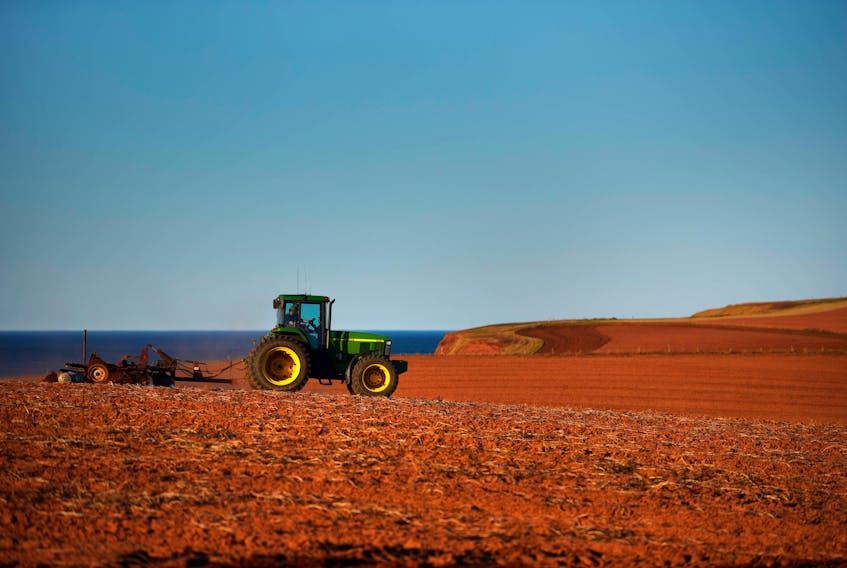An election promise made by the Progressive Conservatives to set up a farm land bank is on hold due in part to a difference of opinion between a provincial department and a consultant tasked with coming up with recommendations related to its establishment.
A farm land bank would involve the province purchasing thousands of acres of arable land. The property could then be leased to new or existing farmers and would be kept in food production.
In a phone interview, Transportation, Infrastructure and Energy Minister Steven Myers told The Guardian that work on establishing a land bank was "in limbo right now."
Myers said this was due in part to delays caused by the COVID-19 pandemic. But it also involves the outcome of $50,000 study into the background of land banks in P.E.I. and in other provinces in Canada.
To carry out the study, the province commissioned Kevin Arsenault, a well-known blogger and gardener who in 2019 ran against Premier Dennis King for the P.E.I. Progressive Conservative party leadership.
"The research he provided was good and we will be able to use it. But arguably, I didn't get what I wanted,” Myers said.
Myers said that when Arsenault was commissioned to conduct the study in the summer of 2019, the expectation was that the research would focus on the “mechanisms” required for his department to purchase land, as well as possible ways in which a land bank could be funded.
Arsenault’s final report, which was quietly posted online in April, contains nine policy-related recommendations about the establishment of the land bank. But it also contained a larger, systemic critique of large-scale industrial agriculture in P.E.I. The report focused heavily on the need for improvement of soil health to be a key policy objective in the establishment of a land bank.

As of 2017, about 25 per cent of farms on P.E.I. have soil organic matter at levels of 3 per cent or higher, a drop from close to 90 per cent in 1998 according to a study published in the Canadian Journal of Soil Science.
"In the author's case, he very much wanted to talk about the health of the soil and other things which, while very important, didn't really fit with what I was trying to accomplish with it," Myers said.
Myers said his focus was on how to ensure younger farmers or smaller-size operations to have more access to farmland than they otherwise would have.
Myers also said his department, which is responsible for land purchases on P.E.I., does not have expertise in soil organic matter. The department of Agriculture was reviewing the research conducted by Arsenault but was not directly responsible for the initiative.
Arsenault disputes that the findings of his report were outside the bounds of what was expected at the outset.
He said he met with Premier King in August 2019, along with principal secretary Adam Ross. In this meeting, Arsenault said he told the premier that he would need to extend the timeline and scope of his research.
"I realized two things. One, I had to do a much more significant jurisdictional scan of all the provinces. And I also needed to do a longer overview of soil-related issues in terms of what's gone on here in the last 20 years," Arsenault said.
"His words exactly — he looked at Adam and he nodded and he said 'we've got to make sure we do this right,'" he said, referring to King.
Arsenault said Myers’ objections to the report’s wider focus are in contrast to his communication with the minister throughout the fall of 2019.
"It's absolutely a betrayal of the policy that I gave to Premier King before he became premier and what he publicly said he was going to do," Arsenault said.
Objectives
P.E.I.'s 1969 Land Development Corporation had as its objectives
- To assist the agriculture industry;
- To acquire, develop and improve land;
- To make land available to farmers;
- To enable consolidation of farm lands;
- To provide credit to farmers for land consolidation; and
- Generally to advance the interests of farmers in an economic and efficient manner in the province.
The corporation was eventually wound down, with most land sold off to farmers by 1990.
Source: Carver Commission, 2013.

Arsenault has been a vocal critic of large-scale agricultural operations for many years. His report was submitted on Dec. 19, 2019, ahead of a Jan. 31, 2020 deadline.
The 128-page study examines land leasing programs in other jurisdictions and the now-defunct land banks that were established in Saskatchewan between 1972 and 1983 and in P.E.I. under the Liberal Alex Campbell government between 1969 and 1990.
The report also examines 20 years of public studies on land use in P.E.I.
Arsenault says the “consistent thread” from these studies is a need to preserve P.E.I. farmland and to restore soil health.
“We hear time and again recommendations to improve soil health, bring nitrate levels within acceptable ranges in ground and surface water, and decrease pesticide use in food production,” Arsenault says in the report.
Arsenault states in the report that much of the responsibility for the declining soil health falls to practices commonly used in “intensive late-variety potato production for the french fry market,” as well as those used in soybean production as a rotational crop.
Arsenault’s recommendations for the establishment of a farm land bank include making soil organic matter a key indicator to assess land parcels considered for purchase or lease.

The report’s eight other land bank recommendations include ensuring the bank be publicly controlled through a collaboration agreement between the Department of Transportation and the Department of Agriculture and Land, and that it be publicly funded to the tune of $100 million. The recommended mechanism for funding involves a $60-million loan from either the Island Investment Development Inc. or Finance P.E.I., as well as an additional $40 million raised through public bonds. The report recommends the land bank purchase 25,000 acres of arable farmland.
The report also includes five recommendations outside the scope of the land bank, including prohibiting the sale of agricultural land to non-residents unless they have a farm plan in place, increasing funding for soil health and testing and completing the first state-of-the -environment report for P.E.I. since 2010.
“Unless a farmland banking system is implemented in conjunction with a multifaceted agricultural and environmental strategy, designed to bring about a progressive transformation in P.E.I. agriculture … such an endeavour will be of little benefit to farmers or Islanders in the long run,” Arsenault writes in the report.
Myers said the wider critique on large-scale commercial agriculture was not what he asked for.
"That's not what I'm trying to accomplish. I'm not trying to attack. I'm trying to put protections in place so that everybody kind of has an equal opportunity to farm on P.E.I. regardless of their past capacity," Myers said.
A 2013 Commission on the Lands Protection Act noted that two prominent agricultural organizations, the P.E.I. Federation of Agriculture and the National Farmers Union, both agreed that establishing a land bank was desirable. The two organizations often disagree on many other matters related to intensive agriculture on P.E.I.
In additional to the $50,000 allocated for Arsenault’s study, a further $50,000 remains budgeted for Myers’ department to continue work focused on establishing the land bank. Myers said this amount would likely be allocated to a more formal staff person on the file.
Myers said he believes the establishment of the land bank, initially slated for next year, will be delayed by six to eight months.
Twitter: @stu_neatby









